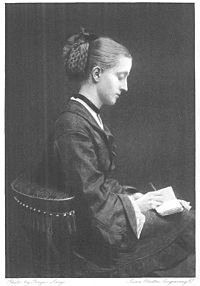Juliana Horatia Ewing facts for kids
Quick facts for kids
Juliana Horatia Ewing
|
|
|---|---|

Juliana Horatia Ewing
|
|
| Born | 3 August 1841 Ecclesfield, Sheffield, England |
| Died | 13 May 1885 (aged 43) Bath, Somerset, England |
| Occupation | Writer |
| Nationality | English |
| Period | 19th century |
| Genre | Children's literature |
Juliana Horatia Ewing (born Gatty, August 3, 1841 – May 13, 1885) was a famous English author. She wrote many wonderful stories especially for children. Her books showed a deep understanding of what children's lives were like. She also loved military things and had strong religious beliefs.
Her Early Life
Juliana was known as Julie. She was the second of ten children. Her father, Rev. Alfred Gatty, was a vicar in Ecclesfield, Yorkshire. Her mother, Margaret Gatty, was also a writer of children's books.
Julie and her siblings were mostly taught by their mother. Julie was often the leader in their activities. They enjoyed drama and studying plants. Later, she helped create a village library in Ecclesfield. She also helped in her church parish with her three sisters. Some of her first stories appeared in Monthly Packet magazine. This magazine was run by Charlotte Mary Yonge.
Marriage and Travels
On June 1, 1867, Julie married Major Alexander Ewing. He was part of the Army Pay Corps. He also loved church and shared Julie's interest in books.
Just one week after their wedding, the Ewings left England. They moved to Fredericton, New Brunswick, Canada. Alexander had a new job there. They lived in Canada for two years. Then, in 1869, they returned to England. They spent eight years in Aldershot, a town known for its army base.
Later Years and Legacy
Julie's health was not good. Because of this, she could not go with her husband when he was sent overseas again. He went to Malta in 1879 and Sri Lanka in 1881.
When her husband came back in 1883, the Ewings moved to Trull, Somerset. In 1885, they moved to Bath. They hoped the new air would help her health. However, she continued to get sicker. After two operations, she passed away in Bath on May 13, 1885. She had a military funeral in Trull three days later.
Julie's sister, Horatia Katharine Frances Gatty, wrote a book about her life and works. This book also listed all of Julie's published stories. Later, another collection included some of Julie's letters and drawings about Canada. A book about her life by Gillian Avery was published in 1961.
Her Famous Children's Books
Roger Lancelyn Green called Juliana Ewing's books the "first outstanding child-novels" in English literature. Her stories are special because they show a deep understanding of children's lives. They also show her love for military things and her strong Anglican faith.
Some of her well-known books include:
- Mrs. Overtheway's Remembrances (1869)
- A Flat Iron for a Farthing (1873)
- Six to Sixteen (1875)
- Jackanapes (1884)
- Daddy Darwin's Dovecot (1884)
- The Story of a Short Life (1885)
Her story The Story of a Short Life inspired Grace Kimmins. Grace started the Guild of the Poor Brave Things. This group helped children with disabilities in London. Grace and later Ada Vachell used a motto from Ewing's book: Laetus sorte mea. This means "Happy in my lot." Ewing's story Madam Liberality (1873) is thought to be about her own life.
Rudyard Kipling said he knew Ewing's novel Jan of the Windmill (1872–1873; 1876) almost by heart. He wrote in his autobiography that he owed a lot to her story "Six to Sixteen." He said it was about "real people and real things." Ewing's story The Brownies (1865) gave the Baden-Powells the idea and the name for the junior level of the Girl Guides. Another writer who admired her work was E. Nesbit.
Juliana Ewing was also a talented artist. Her books were often illustrated by famous artists like George Cruikshank and Randolph Caldecott. She also edited several magazines that published short stories for children. These included the Nursery Magazine from 1856 and Aunt Judy's Magazine from 1866.
 | Madam C. J. Walker |
 | Janet Emerson Bashen |
 | Annie Turnbo Malone |
 | Maggie L. Walker |

